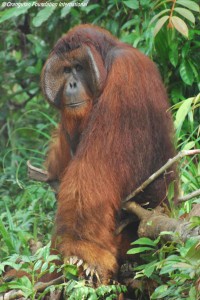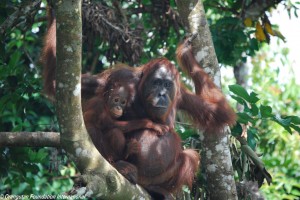-
- In Malay orang means “person” and utan is derived from hutan, which means “forest.” Thus, orangutan literally means “person of the forest.”
- Orangutans are great apes, closely related to their African cousins Chimpanzees, Gorillas, and Bonobos.
- Orangutans are the only Asian Great Ape, found only on the islands of Sumatra and Borneo.
- Orangutans are the only semi-solitary great ape. Unlike their African cousins who live in social groups, orangutans spend most of their time alone or in a mother/offspring pair.
- Orangutans are frugivorous, eating mostly wild jungle fruit.
- Orangutans are largely arboreal, meaning they spend the majority of thier time in the trees not coming to the ground for long periods of time.
- When on the ground, orangutans walk on all fours, using their palms or fists. Unlike the African apes, orangutans are not morphologically built to be knuckle-walkers.
- In the wild, female orangutans usually give birth to their first offspring when they are 15-16 years of age, and orangutans have the longest interbirth interval of any mammal giving birth on average of only every 8 years.
- For the first few years of his/her life, a young orangutan holds tight to his/her mother’s body as she moves through the forest canopy.
- Like humans, orangutans have opposable thumbs. Their big toes are also opposable. Unlike humans, approximately one third of all orangutans do not have nails on their big toes.
- From the age of thirteen years (usually in captivity) past the age of thirty, males may develop flanges and large size.
- Orangutans have tremendous strength, which enables them to brachiate and hang upside-down from branches for long periods of time to retrieve fruit and eat young leaves.

